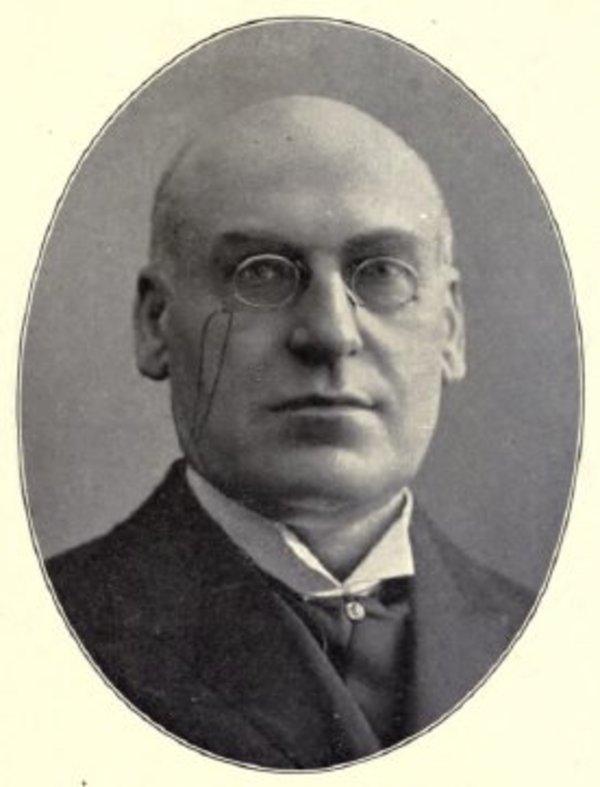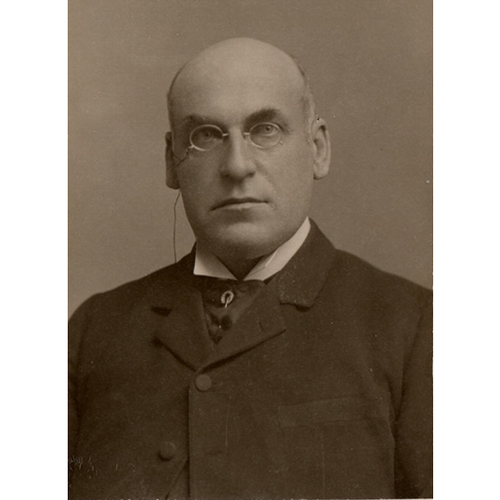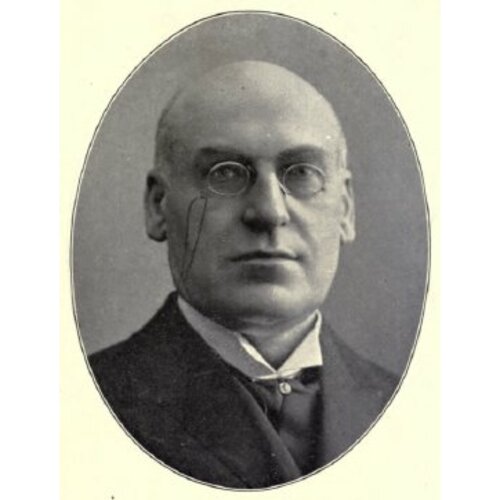
Source: Courtesy of Wikimedia Commons
DUFFY, HENRY THOMAS, lawyer and politician; b. 29 May 1852 in Durham Township at a locality called Atkinson Corner (L’Avenir), Lower Canada, son of John Duffy and Mary Ann Mountain; d. unmarried 3 July 1903 at Quebec and was buried 6 July in the Congregational cemetery in Ulverton, Que.
Three Duffy brothers and their mother, Sarah Smith, natives of Armagh (Northern Ireland), came to live in Durham Township in 1842. The youngest brother, John, settled a few miles from the Rivière Saint-François and became a prosperous farmer. His eldest son, H. Thomas, received the rudiments of education in the country school and then attended St Francis College in Richmond. He continued his studies in Montreal, at McGill College, from which he received a ba in English literature in 1876 and a bcl in 1878. After being called to the bar of the province of Quebec on 11 July 1879, he went to live at Sweetsburg in the Eastern Townships, where he opened a law office.
While building up a substantial practice, Duffy also was active in politics. A Liberal of the old school, he ran in the provincial by-election for Brome in 1889, but without success. Despite this set-back, he remained a faithful supporter of Honoré Mercier* – and there were few in the English-speaking area of the Eastern Townships. Next he went into Municipal government, and in 1894 he took on the office of mayor, which he held for some years. He also became involved in local activities as a warden of the Anglican church in Sweetsburg and a member of the temperance league, among other things.
In the provincial general election of 11 May 1897, which would bring the Liberal party to power, Duffy ran again in Brome, this time successfully. On 26 May Premier Félix-Gabriel Marchand* made him minister of public works. Duffy immediately attracted attention through his strict administration and his cost-cutting measures. A man of imposing presence who was convincing in both English and French, he rapidly emerged as one of the principal speakers in his party and a formidable debater. When a large celebration was held at Quebec on 21 Sept. 1898 unveiling a monument to Samuel de Champlain*, he was the only anglophone invited to speak.
Marchand’s death in the autumn of 1900 left the provincial treasureship vacant, since he had kept the portfolio for himself. The new premier, Simon-Napoléon Parent*, appointed Duffy on 3 October, thus reviving the tradition of choosing the occupant of this office from among the English-speaking members. Duffy applied himself to his duties with his customary zeal and in his first year succeeded not only in balancing the budget, but in realizing a surplus as well, and that was the way matters went as long as he ran the department. In the general election of December 1900 he was returned by acclamation in Brome.
Although Duffy supported Liberal motions in the Legislative Assembly on controversial matters such as the abolition of the Legislative Council, he did not hide his imperialist sentiments. As a fellow of the Royal Colonial Institute of London, he could conceive of Canada’s future and progress only within the empire and under the protection of Great Britain.
Despite ministerial responsibilities, Duffy still had time to pursue his career as a lawyer. He was defence counsel for a number of financial institutions and argued before the highest courts, including the Judicial Committee of the Privy Council in London, where he acted for the Bank of Montreal in the summer of 1897 and for the province in 1902. Made a qc in 1899, he was elected bâtonnier of the provincial bar in 1901; he had also served as bâtonnier in the district of Bedford, where he had been a crown attorney. In this period he was offered a judgeship, but he had no thought of leaving politics.
Duffy received many honours. In the summer of 1902 he represented the province at the coronation of King Edward VII; he had been given an honorary doctorate by the Université Laval that year, and was awarded an lld by Bishop’s College in Lennoxville the next. In 1899 he had been named to the Protestant committee of the Council of Public Instruction as an associate member.
Duffy’s career, which was so promising in politics and in his profession, was cut short by his sudden death at Quebec on 3 July 1903. For nearly a year his health had left much to be desired, but he had insisted on personally supervising the financial yearend procedures. His death was deeply regretted, and tributes to him stressed his absolute integrity, his loyalty, and the work ethic that had inspired him as a self-made man. He may have had opponents, but he was not known to have had enemies.
[There is no full biography of Henry Thomas Duffy. The handful of accounts in the standard biographical works contain errors about his place of birth and marital status. m.-p.r.lab.]
Bibliothèque de l’Assemblée Nationale (Québec), Div. de la Recherche, dossiers des parlementaires. NA, RG 31, C1, 1861, 1871, 1881, Durham Township, Drummond County. Private arch., M.-P. R. LaBrèque (Acton Vale, Que.), Interviews with Béatrice Duffy, 11 Oct. 1988, 10 Sept. 1989, and with Eileen Montgomery, 12 Oct. 1988, 7 Aug. 1989; Eileen Montgomery (Saint-Lambert, Que.), Newspaper clippings. Le Canada, 7 juill. 1903. Montreal Daily Herald, 7 July 1903. Le Soleil, 27 nov. 1897; 22 sept. 1898; 22–23 févr. 1900; 7 mars, 10 juin, 17 août, 9 nov. 1901; 12 juin 1902; 20 févr., 3–4, 7 juill. 1903. Brome County Hist. Soc., Trans. (Montreal), [1 (1897–1901)1: 20, 23; 2 (1901–10): 18–19. Canadian men and women of the time (Morgan; 1898), 291–92. Men of Canada: a portrait gallery . . . (Montreal, [1902?]), 173. Que., Bureau des Statistiques, Annuaire statistique (Québec), 12 (1925): 173; Parl., Doc. de la session, 1899–1902 (Rapport annuel du surintendant de l’Instruction publique). Répertoire du personnel politique québécois, 1867–1982, Pierre Drouilly, compil. (Québec, 1983), 251. P.-G. Roy, La législature de Québec: galerie des membres du Conseil législatif et des députés à l’Assemblée législative (Lévis, Qué., 1897). RPQ. Rumilly, Hist. de la prov. de Québec, vols.9–11. E. M. Taylor, History of Brome County, Quebec, from the date of grants of land therein to the present time; with some records of early families (2v., Montreal, 1908–37), 1: 112a, 182. Who was who, 1897–1915 (1988).
Cite This Article
Marie-Paule R. Labrèque, “DUFFY, HENRY THOMAS,” in Dictionary of Canadian Biography, vol. 13, University of Toronto/Université Laval, 2003–, accessed February 8, 2026, https://www.biographi.ca/en/bio/duffy_henry_thomas_13E.html.
The citation above shows the format for footnotes and endnotes according to the Chicago manual of style (16th edition). Information to be used in other citation formats:
| Permalink: | https://www.biographi.ca/en/bio/duffy_henry_thomas_13E.html |
| Author of Article: | Marie-Paule R. Labrèque |
| Title of Article: | DUFFY, HENRY THOMAS |
| Publication Name: | Dictionary of Canadian Biography, vol. 13 |
| Publisher: | University of Toronto/Université Laval |
| Year of publication: | 1994 |
| Year of revision: | 1994 |
| Access Date: | February 8, 2026 |




